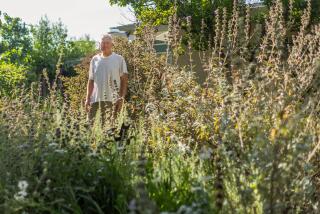This Year, Brown May Be Beautiful : Drought: As cities prepare for the spring rite of selecting top homes and gardens, they may have to take a new look at what’s attractive.
- Share via
Mary and Fred Buksa’s sprightly blue bungalow on Iroquois Avenue in Lakewood won a grand prize last year in the city’s house beautiful contest. This year, instead of helping them garner a prize, the rows of insatiable impatiens, the clusters of perky pansies and that fern in the front yard might prompt the judges to check the couple’s water bill.
In Norwalk, Hiroshi and Mitsuye Nakamoto were among that city’s winners last year. This time around, they would not have a dandelion’s chance in the desert of winning--unless the judges drop “well-maintained lawn” from the list of criteria.
“We can’t water,” said the mournful Mitsuye Nakamoto, whose once-lush green lawn has turned brown.
Five years of drought is forcing Southeast suburbs to rewrite their definition of beautiful as they approach the annual spring rite of picking the prettiest house and garden in town. Cities continue to reward homeowners for having the nicest yards while asking them to cut back on water use.
At its next meeting, the Norwalk Community Promotion Commission will take up the issue of lush versus brown lawns, Commissioner Dean Stockwell said. “I think it needs to be addressed. I really do,” Stockwell said.
Cerritos, which is holding its first Citywide Pride contest this spring, already has decided to give extra points to homeowners who cultivate cacti instead of camellias and plant rock rather than rose gardens.
Pico Rivera may cancel its contest this year. Maureen Hammond, who coordinates the competition conducted by the city’s Arts and Culture Committee, said some committee members fear “the flowers and the grass won’t look as nice.”
And they worry about encouraging pleasant landscapes when “we’re trying to encourage people to conserve water,” said Anna Maria Prieto, committee chairwoman. The committee will decide whether to cancel the contest at the end of the month, she said.
But Montebello is not letting the dryness get it down, declared Mildred Henneforth. The Montebello Beautiful Committee that she heads will instead stress the need for water-saving landscapes, she said.
“Even though the lawns are dry looking, we will not take points away from them,” Henneforth said. “If their lawn is really green looking,” she added, “we may send them a letter asking them what kind of water (they are) using.”
In Lakewood, the committee that gives out the prizes is talking about drastic action on the water front. It is considering checking water bills before it gives out any prizes at its annual awards banquet in June.
“We don’t want to get burned with giving an award to somebody who uses up a lot of water,” said John Spear, a Lakewood Beautiful Committee member.
“You couldn’t have someone squandering water and then give them a prize,” said Jacqueline Rynerson, who is a committee member, a former councilwoman and a gardener herself.
The Lakewood committee already has decided to include an environmental prize this year for the homeowner who best demonstrates that a nice garden need not be a thirsty one. But that does not mean people have to trade all their roses for cacti, committee members said.
“You may change some of your ground cover, or the plantings you’re using,” Rynerson suggested. “Sometimes, people may find they are watering more than they need to.”
Kathleen and Allen Knight, who are committee members as well as winners, are great examples of how to conserve and still have a lovely garden, Rynerson said.
“I reduced my water consumption (last year) by 28% and my home was still judged the best in northern Lakewood,” Allen Knight boasted. Avid gardeners, the Knights have more than 50 rose bushes that they treasure.
Knight can tick off a list of ways he keeps the roses blooming at the same time he is conserving water. He makes heavy use of mulches such as sawdust, waters early in the morning so the dew drops back down into the earth, and has low-flush toilets.
Mary Buksa, meanwhile, admits that all this talk about water conservation is making her uncomfortable.
“I feel guilty even having flowers,” she said, adding that she already has cut back on her plantings this year and hardly ever waters. “I figure I’ll just let them die after Easter if we don’t have any water.” She added that, like everyone else, she and her husband and three children are also cutting back on their water use inside their house.






